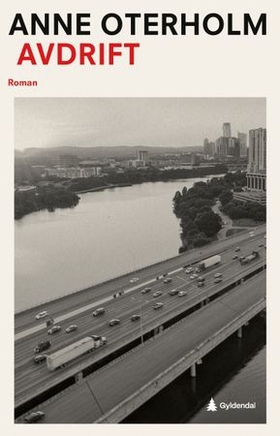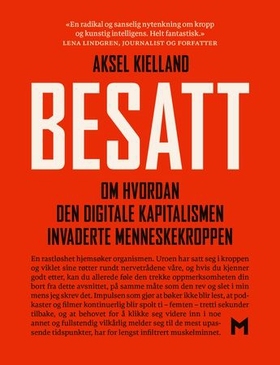Eivind (like the Terrible) started reading Akata Woman by Nnedi Okorafor

Akata Woman by Nnedi Okorafor
From the moment Sunny Nwazue discovered she had mystical energy flowing in her blood, she sought to understand and control …
I like big books and I cannot lie
This link opens in a pop-up window
Success! Eivind (like the Terrible) has read 100 of 100 books.

From the moment Sunny Nwazue discovered she had mystical energy flowing in her blood, she sought to understand and control …

Oh William! is a novel by American writer Elizabeth Strout, published on October 19, 2021, by Random House. The novel …

En middelaldrende mann ligger våken i en stor seng i Texas, fanget i sine egne kvernende tanker. Kona har forlatt …
@3ivin6 Dette kan jeg kjenne meg igjen i. Når jeg var tenåring tenkte jeg at å holde på med datamaskiner om det var dataspill eller diverse internett-greier alltid var overlegent å titte på tv. Den som tittet på (linjær)tv satt der bare å tok inn det den ble servert. Den som spilte ett dataspill hadde ikke bare valgt det, valgt hva den ville spille, men den gjorde noe aktivt.
I dag er ikke bare tv-apparatene større enn noensinne. Samtidig er linjær-tv dødt og vår tv-konsumsjon ligner på dataspill, ett dataspill der du på overflaten gjør valg, men der den i realiteten er ett linjær-tv-skrømt som trykker innhold ner i kjeften på oss.
Far away and long ago, when dragons still existed and the only arcade game was ping-pong in black and white, a wizard cautiously entered a smoky tavern in the evil, ancient, foggy city of Morpork and sidled up to the bar.
“Here in Shangri Larf we find amazing secret of living for long time,” said the Lama. “For example, I am two hundred years old. “We tell jokes all day, everyone keep happy, live long time,” continued the Lama. “Also, prophecy say when all jokes in world been told nine billion times, whole world come to end, just like that, and everyone allowed to go home.”
“Fourteen whole days without having to work for Trouser, Trouser, Middling, and Fedge,” he thought.
“This isn’t really dragon country,” observed Ralph. “It must have got lost,” said Fortnight. “It’s the green variety,” said Pilgarlic. “They grow to be seven meters high, and then they go round roaring, rampaging, setting fire to people’s houses and generally doing wicked deeds.” “What sort of wicked deeds?” asked Ralph. “Oh, er, well, I don’t really know. Walking on the grass or squeezing toothpaste tubes in the middle, I suppose.”
What had happened was that some radio men had gone along to the castle to record the king’s Christmas message—and the king wasn’t there. Frantic search parties set out at once. People suddenly realized that without the king, ships would go unlaunched, civic buildings unopened, and the only person they could put on their stamps was the Prime Minister.*
- Who was not very impressive.
@jbenjamint@mastodon.scot Det er ikke alt som er like overbevisende, sånn er det ofte for meg når jeg leser filosofi fra folk med medievitenskapsbakgrunn, men vel verdt å lese. Jeg likte godt de passasjene som bekrefta mine allerede sterke meninger om ting som innholdsbegrepet og hvordan barn blir dressert til markeds- og individualistisk opp-og-fram-tenking av de kommersielle sosiale mediene.

Vårt forhold til teknologi beskrives vanligvis med utgangspunkt i hjernen. Men alle som noensinne har følt den akutte trangen til …
Det er fullt mulig å hevde at hovedforutsetningen for at KI-tjenestene har blitt så populære som de har, er at en betydelig andel av tekstene, bildene og videoene som utgjør det moderne internett i praksis bare er meningsløs støy vi skroller forbi uten å ta noen større notis av det – og at dette er noe alle innerst inne er på det rene med. Et illustrerende eksempel på denne epidemiske meningsløsheten er matoppskrifter som ligger gratis tilgjengelig på internett. Mange år før ChatGPT så dagens lys, begynte disse oppskriftene å ese ut, med lange utlegninger om den aktuelle rettens historie, langtekkelige selvbiografiske anekdoter og andre bisarre digresjoner som gjorde det til et svare strev å lokalisere informasjonen man søkte. Denne utviklingen skyldes at disse bloggene og nettsidene var reklamefinansierte, hvilket innebar at jo mer tekst oppskriftene inneholdt, jo mer reklame kunne man eksponere publikum for. Dette skapte en kultur for en type tekst som ikke var ment å bli lest så mye som å fungere som en hinderløype mellom leseren og det han var på jakt etter – altså ingredienslisten og beskrivelsen av fremgangsmåten.
— Besatt by Aksel Kielland
Begrepet «innhold» springer ut av det faktum at vi i dag konsumerer filmer, musikk, nyheter, billedkunst, politiske appeller, mediepersonligheter og vitnesbyrd fra krigssoner via de samme telefonene og datamaskinene, og dermed trenger et begrep som lar oss omtale alle disse tingene under ett. Men selv om begrepet er nyttig – og altså kan hevdes å ha en McLuhansk opprinnelse – fungerer det like mye som en besvergelse som en beskrivelse. Hver gang man omtaler film og litteratur som innhold, bidrar man til å undergrave deres status som film og litteratur. Innholdsbegrepet forflater og relativiserer verdien og betydningen av alt det brukes om, til de opprinnelige kontekstene smuldrer opp og mister sin betydning. Den moderne forbrukeren tilpasser seg ikke, han forventer at alt tilpasses hans ønsker og behov. Slik oppstår en teknologisk og psykologisk infrastruktur der det er plass til alt – til hva det skal være – men på den ufravikelige betingelsen at alt behandles som innhold som sirkulerer i en økonomi og forbrukes. Ingenting tilkjennes noen privilegert status eller noen særskilt plass i menneskelig kultur og samfunnsliv. Å anerkjenne innholdets logikk er å legitimere et system som søker å instrumentalisere alt mennesker lager, sier og gjør, og bruke det til å holde oss lenket til skjermene våre.
— Besatt by Aksel Kielland